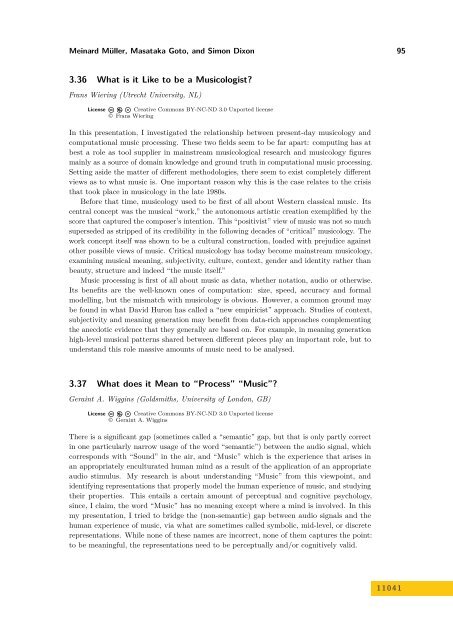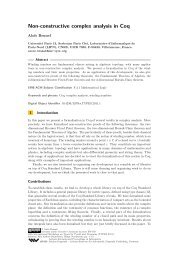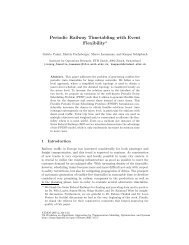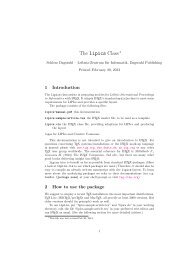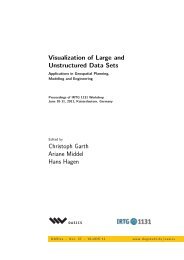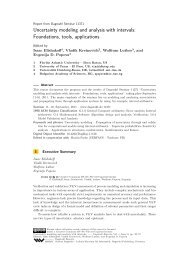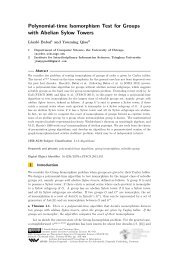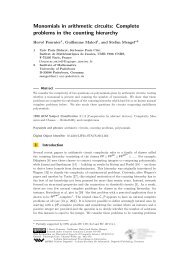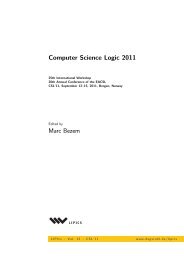Volume 1, Issue 1, January 2011 - DROPS - Schloss Dagstuhl
Volume 1, Issue 1, January 2011 - DROPS - Schloss Dagstuhl
Volume 1, Issue 1, January 2011 - DROPS - Schloss Dagstuhl
Create successful ePaper yourself
Turn your PDF publications into a flip-book with our unique Google optimized e-Paper software.
Meinard Müller, Masataka Goto, and Simon Dixon 95<br />
3.36 What is it Like to be a Musicologist?<br />
Frans Wiering (Utrecht University, NL)<br />
License Creative Commons BY-NC-ND 3.0 Unported license<br />
© Frans Wiering<br />
In this presentation, I investigated the relationship between present-day musicology and<br />
computational music processing. These two fields seem to be far apart: computing has at<br />
best a role as tool supplier in mainstream musicological research and musicology figures<br />
mainly as a source of domain knowledge and ground truth in computational music processing.<br />
Setting aside the matter of different methodologies, there seem to exist completely different<br />
views as to what music is. One important reason why this is the case relates to the crisis<br />
that took place in musicology in the late 1980s.<br />
Before that time, musicology used to be first of all about Western classical music. Its<br />
central concept was the musical “work,” the autonomous artistic creation exemplified by the<br />
score that captured the composer’s intention. This “positivist” view of music was not so much<br />
superseded as stripped of its credibility in the following decades of “critical” musicology. The<br />
work concept itself was shown to be a cultural construction, loaded with prejudice against<br />
other possible views of music. Critical musicology has today become mainstream musicology,<br />
examining musical meaning, subjectivity, culture, context, gender and identity rather than<br />
beauty, structure and indeed “the music itself.”<br />
Music processing is first of all about music as data, whether notation, audio or otherwise.<br />
Its benefits are the well-known ones of computation: size, speed, accuracy and formal<br />
modelling, but the mismatch with musicology is obvious. However, a common ground may<br />
be found in what David Huron has called a “new empiricist” approach. Studies of context,<br />
subjectivity and meaning generation may benefit from data-rich approaches complementing<br />
the anecdotic evidence that they generally are based on. For example, in meaning generation<br />
high-level musical patterns shared between different pieces play an important role, but to<br />
understand this role massive amounts of music need to be analysed.<br />
3.37 What does it Mean to “Process” “Music”?<br />
Geraint A. Wiggins (Goldsmiths, University of London, GB)<br />
License Creative Commons BY-NC-ND 3.0 Unported license<br />
© Geraint A. Wiggins<br />
There is a significant gap (sometimes called a “semantic” gap, but that is only partly correct<br />
in one particularly narrow usage of the word “semantic”) between the audio signal, which<br />
corresponds with “Sound” in the air, and “Music” which is the experience that arises in<br />
an appropriately enculturated human mind as a result of the application of an appropriate<br />
audio stimulus. My research is about understanding “Music” from this viewpoint, and<br />
identifying representations that properly model the human experience of music, and studying<br />
their properties. This entails a certain amount of perceptual and cognitive psychology,<br />
since, I claim, the word “Music” has no meaning except where a mind is involved. In this<br />
my presentation, I tried to bridge the (non-semantic) gap between audio signals and the<br />
human experience of music, via what are sometimes called symbolic, mid-level, or discrete<br />
representations. While none of these names are incorrect, none of them captures the point:<br />
to be meaningful, the representations need to be perceptually and/or cognitively valid.<br />
1 1 0 4 1


